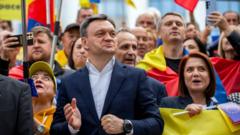Will Moldova's Election Defy Russia's Influence?

Published: 2025-09-27 04:20:32 | Category: technology
This article explores the escalating tensions in Moldova as the nation approaches a pivotal election, with evidence suggesting significant Russian interference aimed at undermining pro-European policies. Authorities have disclosed instances of vote-buying and disinformation linked to Russia, while a pro-European party rallies its supporters against the backdrop of a potential Russian resurgence in the region.
Last updated: 16 October 2023 (BST)
Key Takeaways
- Evidence of Russian election interference in Moldova includes vote-buying and orchestrated disinformation campaigns.
- The governing party, PAS, is mobilising voters by highlighting the risks of pro-Russian candidates.
- Opposition parties, including the Socialist Party led by Igor Dodon, dismiss claims of foreign meddling as a political tactic.
- Public sentiment is deeply divided, with many citizens expressing frustration over economic issues and political promises.
- The election is seen as a critical juncture for Moldova's future relations with the EU and Russia.
The Context of Moldova's Election
Moldova, situated between Romania and Ukraine, has historically been influenced by both Western and Eastern powers. Since gaining independence in 1991, the country has navigated a complex political landscape. The recent full-scale invasion of Ukraine by Russia marked a significant turning point for Moldova, prompting a shift towards EU integration. This election is framed as a critical moment in the country’s trajectory, with the ruling party, the Action and Solidarity Party (PAS), positioning itself as the defender of pro-European values against Russian interference.
Election Interference: A Growing Concern
As the election date approaches, Moldovan authorities have revealed alarming evidence of election interference orchestrated by Russian interests. This includes extensive vote-buying schemes and disinformation campaigns aimed at discrediting the governing party. Police and prosecutors have indicated that these tactics are unprecedented in scale, with Russian-backed groups reportedly investing heavily in efforts to destabilise the current government.
Mobilising Support: The PAS Strategy
The PAS, under Prime Minister Dorin Recean, is making a concerted effort to mobilise voters by emphasising the potential consequences of a Russian-aligned government. Their campaign materials starkly contrast promises of EU membership and prosperity with warnings of the dangers that pro-Russian candidates pose. This messaging aims to galvanise public support by framing the election as a "final battle" for Moldova's future.
The Opposition's Stance
While the ruling party focuses on external threats, opposition parties, particularly the Socialist Party led by Igor Dodon, downplay the significance of Russian interference. Dodon has positioned himself as a pragmatic alternative, advocating for a balanced approach to international relations. He argues that maintaining ties with Russia is essential for Moldova's economic stability, especially given the current energy crisis exacerbated by the war in Ukraine.
Public Sentiment: Economic Realities vs. Political Promises
The Moldovan public is feeling the strain of economic hardships, with many citizens expressing dissatisfaction over the government's ability to deliver on promises. Stories from everyday citizens reveal a stark reality; families struggle with low wages and rising costs of living, leading to widespread disillusionment with the political process. This sentiment is compounded by the exodus of many Moldovans seeking better opportunities abroad, further complicating the electoral landscape.
Russian Influence: Tactics and Implications
Russian influence in Moldova is not new, but recent events indicate a more sophisticated approach to interference. Reports suggest that Russia has invested heavily—potentially more than £300 million—in efforts to sway the election. This includes utilising cryptocurrency and advanced tactics to finance electoral manipulation, marking a shift from traditional methods of influence.
Potential Outcomes and Future Implications
The outcome of this election could have significant repercussions, not only for Moldova but for the broader geopolitical landscape in Eastern Europe. A government sympathetic to Russian interests could potentially destabilise the region further and pose a threat to EU efforts to curb Russian influence. Conversely, a victory for the pro-European PAS could solidify Moldova's path towards EU integration, reinforcing its stance against Russian aggression.
Conclusion: The Stakes Are High
As Moldova prepares for this critical election, the stakes could not be higher. The interplay between external influences and internal political dynamics will shape the country's future for years to come. With allegations of interference and the spectre of economic instability looming large, voters are faced with a challenging decision that could redefine Moldova's identity and its place in Europe.
FAQs
What is the significance of the upcoming election in Moldova?
The election is crucial for determining Moldova's political alignment, particularly its relationship with the EU and Russia. It represents a pivotal moment in the country's pursuit of European integration against a backdrop of Russian interference.
What evidence is there of Russian interference in Moldova's elections?
Moldovan authorities have reported extensive vote-buying and disinformation campaigns linked to Russian interests, with significant financial investments aimed at destabilising the current government.
How are Moldovan citizens feeling about the election?
Many citizens express frustration over economic conditions, such as low wages and high living costs, leading to widespread disillusionment with political promises and candidates.
What are the main political parties involved in the election?
The main parties include the governing Action and Solidarity Party (PAS) and the opposition Socialist Party led by Igor Dodon, alongside other smaller parties and coalitions.
What could happen if a pro-Russian government is elected?
A pro-Russian government could undermine Moldova's aspirations for EU membership and potentially escalate tensions in the region, particularly with Ukraine and other Eastern European countries.



